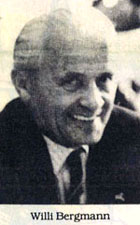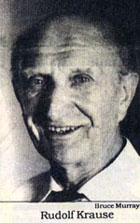Treating the enemy
German POWs in the U.S. received different treatment than Guantánamo detainees
“Wir sind gut behandelt worden – sehr gut behandelt worden.”
(“We were treated well – very well.”)
– Rudolf Krause, former German prisoner of war in the U.S.
These words echo in my mind 16 years after I interviewed Herr Krause and two of his comrades at Ft. Leonard Wood, Mo., during a 50-year reunion of their internment. It was striking then – and even more striking now in the wake of the “war on terror” – that these former POWs had nothing bad to say about their former captors. In fact, they were quite grateful.
“Roosevelt sent us the message that we didn’t come as POWs, but as guests,” said Willi Bergmann, another former POW. “They only occasionally forgot that.”
Clearly, times have changed in the more than 60 years since these men were captured from Field Marshall Erwin Rommel’s famed Afrika-Korps and brought to the U.S. to work on farms, rock quarries and laundry rooms. Documents released from the Bush era indicate that abusive treatment of captives was not an occasional slip-up, but officially sanctioned policy. Former Vice President Dick Cheney defends the past administration’s policies as essential to protect national security; and John Yoo, a member of Bush’s Justice Department, continues to uphold the legal rationale for the administration’s behavior.
Granted, Al Qaeda captives at Guantánamo are not the same as the former German POWs at Ft. Leonard Wood: The Germans I met were foot soldiers in a traditional military structure, not self-radicalized terrorists on a self-motivated killing spree. The Germans were conscripts who followed the orders of their superior officers (not that this always flies as an excuse for murder).
On the other hand, these elderly and affable German gentlemen were once the muscle of one of the most destructive and criminal war machines the world has ever seen. Why not stick it to them and make them feel some pain the Londoners felt during the Battle of Britain; what the Russians and Poles felt during the Blitzkrieg; and what the Jews felt in Auschwitz? Why not?
Quite simply, as Chapman Law Professor Lawrence Rosenthal said in a recent debate with John Yoo, “torture should always be considered as breaking the law of nature.” In other words, torture is a crime against humanity – no matter how inhumane, religiously psychotic or radical “the enemy” might be.
It is perhaps one of the greatest accomplishments of “the Greatest Generation” for turning our former mortal enemies into loyal friends. This certainly wasn’t done without some brutal vengeance – the bombing of Dresden, Hiroshima and Nagasaki to name a few instances.
But listening to former Bush administration officials uphold, and even boast of abusive behavior and disregard of anti-torture conventions, one wonders about the idea of “progress” when it comes to humanity and morality.
“Es ist ein ganz besonderes Erlebnis, nach 50 Jaheren wieder herzukommen. Wir sind sehr dankbar, dass die Amerikaner uns eingeladen haben.”
“It is a very special experience to come back here after 50 years,” Lothar Nickel, another former German POW, told me. “I am thankful to the Americans for having us here.”
I doubt that the detainees at Guantánamo Bay will be saying the same thing in 50 years. Some of them, like Abu Zubaydah, was tortured so severely that he now reportedly suffers from brain damage and never will be able to resume a normal life. Others, such as the 17 Uighurs set for release to the United States, will hopefully learn to forgive their former captors.
I hope Rudolf, Willi and Lothar are still alive and well. They could teach us a few things about how to treat our enemies.


